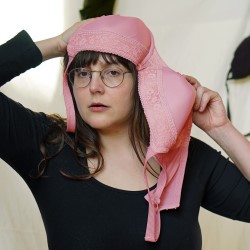Interview – James Platt, Sheffield Interview – Matthew Heppell & James Platt, Sheffield University Theatre Company
We are delighted to have had the opportunity to interview writer and director Matthew Heppell and assistant director James Platt of Sheffield University Theatre Company’s (SUTCo) season opener “Something To Do With Bolivian Affairs”, which the company are performing at the University of Sheffield Drama Studio from 30th October to 1st November.
Q. Please tell us more about yourself and how you became involved in SUTCo?
James: I’ve just started my fourth year both at the university and in SUTCo. I graduated from my undergrad course in Psychology a few months ago, and am beginning an MSc in neuroscience. Auditioning was one of the first things I did at the university – they just happened to be putting on a play I love, The Madness of George III, so I showed up to auditions. I didn’t even get a callback for it, but while I was there I decided to give one of the other plays a go too. I was cast in that, and ever since I’ve been involved in at least one SUTCo show per semester.
Matthew: I’m a 4th year student who graduated with a degree in Politics a few months ago and am currently doing a PGCE in English. I became involved in SUTCo in the first week of my first year at University, when I auditioned for a production of The Madness of George III, and got cast as a small character called Doctor Baker, which involved me drinking urine (in reality, blueberry juice) on stage. Something must have clicked there, because that was over three years ago now and I’m still kicking about, so I suppose I must quite like it.
Q. Before we discuss the show, the last time I saw SUTCo was at the preview of Peace Circle, before taking it up to this year’s Edinburgh Fringe. How did it go up at the festival?
Matthew: I was in the cast of that show, and we had a really wonderful time. Being around so many people passionate about theatre was amazing, and getting to see so many shows (some of them for free!) with such variety between them all is something you can only really do at the Fringe. I hope I get a chance to go again, because it really is special up there.
James: I wasn’t involved with this year’s show, but the last show we took to the Fringe in 2022 I wrote and directed. It’s incredibly different at the Fringe compared to SUTCo’s usual way of doing things, but it’s so exciting – the Sheffield reviewers are definitely kinder though!
Q. Now on to the play, tell me more about it, what inspired it and what can audience members expect?
Matthew: The idea for the play came from two different places. I was studying Private Lives by Noel Coward at school and really took a liking to it; mostly because of the incredibly stylised dialogue and almost rhythmic nature of the jokes, and I fancied seeing if I could write something with a similar comedy-of-manners vibe as Coward’s work, and other writers of that genre like Oscar Wilde. The other inspiration came from the Russian invasion of Ukraine in February 2022 (not a commonly cited incident in the backgrounds of comedy plays I should suspect); I noticed the nature of how people discussed it in the buildup to the event; everyone in my life had strong opinions with very little knowledge of the events and what was actually happening. This is not to say I wasn’t the same; I absolutely was, but I wondered if there was potential in this relationship between the public and geopolitics for some satire to be weaved into the idea for a play I’d already had; and to make the main thematic message of the whole piece a critique of the way the horrors of the world can become somewhat of a background feature of our lives – we become so far removed from other people’s suffering that it is merely a point of conversation at parties to fill the time. And I wanted to explore that. That all sounds rather lofty and self-important though, the play is still good fun I promise!
James: I’ll leave the inspirations to Matthew as the writer, but I think the audience can expect something really special. It’s always hard to market a student written show, but this play is absolutely hilarious and has a genuinely ingenious plot. There’s a lot of references to things the audience will relate to, even if the events of the play are entirely fictional – the themes and jokes stand up completely.
Q. Where does the play’s title come from and why did you go for Bolivia?
Mathew: The play’s title comes from the document that I wrote the outline of the plot on; which I did whilst I should have been revising for my A Levels. In my state of procrastination, I opened an empty document and named it ‘Something to do’, as that was my intention at first. One thing led to another and I started writing down the ideas for this story I’d been kicking around for a while, and I found that the phrase ‘Something to do’ sort of fit with the theme I was trying to explore. If you’re talking about something you don’t really know about, it phrase ‘something to do with this’ or ‘something to do with that’ might pop out in the same way ‘yada yada yada’ is used in Seinfeld to get from A to Z in a point and leave out all the bits you can’t really talk fluently about. And that’s where the title came from. When it came to choosing Bolivia, I wanted the war to be entirely fictional, I wasn’t meaning to comment on any particular political situation, I wanted the satirical theme of the show to be applicable to anything to audience wanted it to be, and if I’d picked a place with a very clear cultural association in an audience’s mind with a particular event or time, it would’ve left less room for interpretation, which I didn’t want to do. Which is why I settled on Bolivia. I also think it sounds nice.
Q. The characters in the play are beyond your years and a different social status, a divorced couple and an MP, this is something that from past shows I know SUTCo is great at, but how do you go about getting the knowledge and life experience to bring those characters to life?
James: Honestly, from watching other people’s work. Both Matthew and I have seen a lot of theatre through SUTCo, and I myself have been lucky enough to see a huge number of professional plays as well. Watching other people bring characters like these to life has really demonstrated how I can work with the actors to do the same. Also, even if neither of us know what it’s like to be divorced, we know what it’s like to absolutely hate someone’s guts. Even if neither of us have been an apathetic MP, we know what it’s like to hate your job. We can use our own experiences to begin to understand these characters’ motivations, and this is also what will connect to our audience: I doubt a lot of MPs will be coming to see our play (even if they should!) but the people who do will still be able to relate to and enjoy Arthur Doubt as a character.
Matthew: I don’t know. George Lucas has never actually gone to space or been a Wookie, yet he made Star Wars and wrote Chewbacca. So long as you know the themes you want to convey and the story you want to tell with your characters, I think anybody can theoretically write anything if they put the time, energy and love into the process. It’s true I’ve never been divorced, but I’ve seen people split up in both real life and in fiction, so I never really thought about it as writing something completely alien to me. You can’t grow up in this country without meeting a few sad men who can’t get over someone along the way, so the inspiration kind of came from that. And I have been an MP. Matthew Heppell is my pen name. My real name is Nadine Dorries.
Q. Are there any challenges to presenting new writing as the season opener for a student theatre company?
James: It’s definitely harder to convince people to audition. Big names do a lot of the work when encouraging first years to give SUTCo a go (it’s what got me into the audition room anyway!) and without that, your script and advertisement really has to stand up to scrutiny. Fortunately, Matthew’s play absolutely does stand the test: we’ve just had two amazing nights of auditioning people both new and old to the society, and we just have to trust that prospective audiences will see the same quality and promise that our auditionees did!
Matthew: It’s a double edged sword. Obviously for freshers auditioning, they hear a famous title with a famous name for one show, and something completely unfamiliar written by Billy Randomer over here and it does influence what they’re thinking. But we still had a good turnout from people who didn’t know who the hell I am (i.e. the vast majority of the population of the Earth). On the other hand, getting the chance to be the first and possibly only actor to ever play a role is incredibly exciting; I know this from experience.
Q. You’re performing at the University Drama Studio, a venue I know well. What’s it like having that space available for the company?
James: Absolutely amazing. To be able to put on something we’ve created in such a professional and beautiful space is such a dream for everyone in theatre, and it’s so important that there are spaces like the Drama Studio for young theatre makers to see their work and see what they could be. It’s also a very familiar space now, which is lovely – no stress about where things are or how things work, which takes away so much stress.
Matthew: It’s fantastic, I love the drama studio, and I wouldn’t want the show to be performed anywhere other than there. Not even on the West End or Broadway. The drama studio is better. And a lot of people have been saying that.
Q. As a company do you have that awareness that not only are you your members first introduction to being on stage and behind the scenes but often you are your audience’s first introduction to theatre as well?
James: Absolutely. Part of advertising SUTCo to other students is an opportunity to see theatre for very low prices, sadly a very rare opportunity elsewhere in the city. The way we work allows us to keep prices for our audiences low, and we hope this gives them the freedom to take a chance on things they might not otherwise have chosen. Because of this, we try to do a mixture of shows our fellow students may be familiar with, and new material like Bolivian Affairs: if we can gain their attention and trust, it’s wonderful to be able to show people new things.
Matthew: Of course, and I feel an enormous sense of responsibility for that. If just one person has their first ever theatre experience seeing Something To Do With Bolivian Affairs and decides maybe they should try and go to the theatre more often… well, I’ll be so happy I’ll probably do a backflip.
Q. And finally what’s come up for you after the show and university. Are you hoping to stay in theatre?
Matthew: As I mentioned, I’m doing a PGCE in English and will hopefully be teaching full time this time next year. I will always try to be involved in theatre though; I don’t know who I’d be without it to be honest.
James: My love of SUTCo got me into journalism through reviewing shows, and I am now editor of the Arts and Culture section of Forge Press, the student newspaper. While theatre has always been a hobby and nothing more, I am hoping to combine my love of journalism with my education in neuroscience once I have graduated. Whatever I do with my life, the skills I have learned as part of SUTCo will no doubt stay with me and benefit me.
To book for Something To Do With Bolivian Affairs visit https://www.ticketsource.co.uk/whats-on/shearwood-road/sheffield-university-drama-studio/something-to-do-with-bolivian-affairs-by-matthew-heppell/e-erayok.





